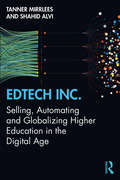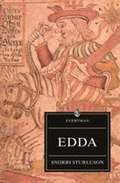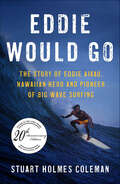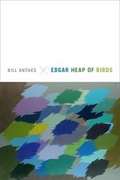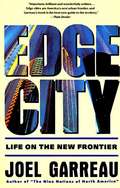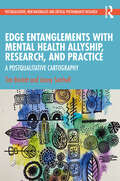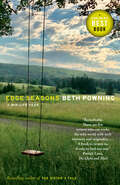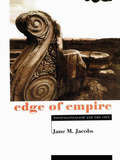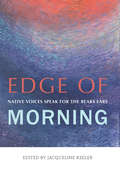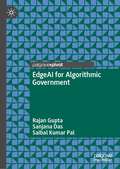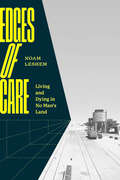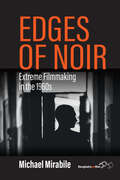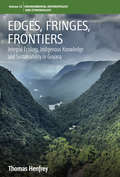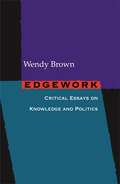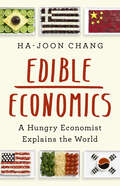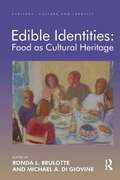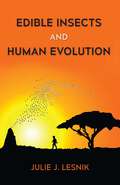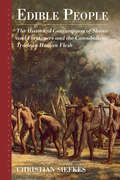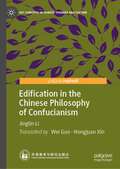- Table View
- List View
EdTech Inc.: Selling, Automating and Globalizing Higher Education in the Digital Age
by Shahid Alvi Tanner MirrleesThis book advances a critical political economy approach to EdTech and analyses the economic, political and ideological structures and social power relations that shape the EdTech industries and drive EdTech’s development and diffusion. Particular attention is paid to the integration of EdTech with some of the most contentious developments of our time, including platformization and data-veillance, the automation of work and labor, and globalization-imperialism. By using a political economy of communication approach, this book will be of value to anyone interested in the current transformations of capitalism, the State, higher education and online learning in the digital age.
Edda
by Snorri Sturluson Anthony FaulkesOver a period of twenty years, Snorri Sturluson, scholar, courtier and poet, compiled the prose EDDA as a textbook for young poets who wished to praise kings. His work surveys the content, style and metres of traditional Viking poetry and includes a poem of Snorri's own, praising the king of Norway. Ironically, Snorri was killed in his own cellar in 1241 on the instigation of the king of Norway as a result of political intrigue. The EDDA contains the most extensive account of Norse myths and legends that has survived from the Middle Ages. This is the only edition available with introduction, text summaries, indexes and chronology of early Icelandic literature.
Eddie Would Go: The Story of Eddie Aikau, Hawaiian Hero and Pioneer of Big Wave Surfing
by Stuart Holmes ColemanThis biography of legendary Hawaiian surfer Eddie Aikau is “a homespun homage to a modern-day folk hero” (Outside Magazine).In the 1970s, a decade before bumper stickers and T-shirts bearing the phrase Eddie Would Go began popping up all over the Hawaiian islands and throughout the surfing world, Eddie Aikau was proving what it meant to be a “waterman.” As a fearless and gifted surfer, he rode the biggest waves in the world; as the first and most famous Waimea Bay lifeguard on the North Shore, he saved hundreds of lives from its treacherous waters; and as a proud Hawaiian, he sacrificed his life to save the crew aboard the voyaging canoe Hokule’a.From Stuart Holmes Coleman, Eddie Would Go is the “fascinating” story of Eddie Aikau’s life and legacy, a pipeline into the exhilarating world of surfing, and an important chronicle of the Hawaiian Renaissance and the emergence of modern Hawaii (San Francisco Chronicle).“Enlightening . . . an impressive history.” —Surfing Magazine“A meaningful biography of a surfing hero . . . extraordinary.” —San Diego Union-Tribune“Coleman, a surfer himself, does an admirable job of de-mystifying this remarkable man.” —St. Petersburg Times
Eden Built by Eves: The Culture of Women's Music Festivals
by Bonnie J. MorrisReaders take an exhilarating insider's journey through women's music festivals in the lesbian subculture complete with candid backstage interviews and photographs.
Eden in the Altai: The Prehistoric Golden Age and the Mythic Origins of Humanity
by Geoffrey AsheReveals how humanity’s first advanced culture originated in the Altai-Baikal region of southern Siberia • Explores how this prehistoric culture is the source of the pervasive mythic symbolism of the number 7, found in ancient cosmologies and myths around the world • Traces the Altaic influence on the Rishis of India, the creation of the Vedas, and the origin of the sacred legend of Mount Meru • Explains how the Hellenic cults of both Apollo and Artemis originated in southern Siberia as well as the pervasive bear symbolism found throughout the ancient world Myths of a Golden Age, a paradise at the beginning of human existence, are nearly universal in all cultures. But where was this “Eden” located? Refuting the traditional assumption that the cultures of the Middle East and Mycenae filtered northward into Europe and North Asia, noted historian Geoffrey Ashe instead identifies the northern Altai mountain range and Lake Baikal region of southern Siberia as the true cultural home of humanity and the source of the widespread myths of a prehistoric Golden Age. With evidence dating back as far as 24,000 BC, Ashe shows how the culture of prehistoric southern Siberia was matrifocal, Goddess-worshiping, and heavily shamanic and served as the progenitor of advanced ancient culture in the Western world, the missing link that later influenced Indian, Middle Eastern, Native American, and European society, culture, and religion. He reveals how ancient Altaic culture was the source of the pervasive mythic symbolism of the number 7, found in cosmologies and mythological traditions around the world, as well as reverence for the seven stars of Ursa Major, the Big Dipper, and the idea of a “sacred mountain to the North.” He traces the transmission of these cosmological beliefs into Babylon and ancient Greece by migrating tribes, including those that crossed the now-vanished land bridge to the New World. Ashe reveals how this transmission of beliefs had a profound influence on the seven-note musical scale, the seven astrological planets, and the seven vowels of the Greek alphabet, as well as the development of seven as a sacred number in Judaism. He shows how the ancient Altai-Baikal culture influenced the Rishis of India, the creation of the Vedas, and the sacred legend of Mount Meru. He also reveals how the Hellenic cults of both Apollo and Artemis originated in southern Siberia as well as the sacred bear symbolism found throughout the ancient world. Offering proof that advanced cultures existed in Europe before the immigration of Eastern peoples, Ashe shows that early societies did not look into the future for perfection but to the past, to the Golden Age of peace in the sacred northern mountains.
Eden on the Charles: The Making of Boston
by Michael RawsonDrinking a glass of tap water, strolling in a park, hopping a train for the suburbs: some aspects of city life are so familiar that we don’t think twice about them. But such simple actions are structured by complex relationships with our natural world. The contours of these relationships—social, cultural, political, economic, and legal—were established during America’s first great period of urbanization in the nineteenth century, and Boston, one of the earliest cities in America, often led the nation in designing them. A richly textured cultural and social history of the development of nineteenth-century Boston, this book provides a new environmental perspective on the creation of America’s first cities. Eden on the Charles explores how Bostonians channeled country lakes through miles of pipeline to provide clean water; dredged the ocean to deepen the harbor; filled tidal flats and covered the peninsula with houses, shops, and factories; and created a metropolitan system of parks and greenways, facilitating the conversion of fields into suburbs. The book shows how, in Boston, different class and ethnic groups brought rival ideas of nature and competing visions of a “city upon a hill” to the process of urbanization—and were forced to conform their goals to the realities of Boston’s distinctive natural setting. The outcomes of their battles for control over the city’s development were ultimately recorded in the very fabric of Boston itself. In Boston’s history, we find the seeds of the environmental relationships that—for better or worse—have defined urban America to this day.
Edgar Heap of Birds
by Bill AnthesFor over three decades, contemporary Native American artist Hock E Aye Vi Edgar Heap of Birds has pursued a disciplined practice in multiple media, having shown his paintings, drawings, prints, and text-based conceptual art throughout numerous national and international galleries and public spaces. In the first book-length study of this important artist, Bill Anthes analyzes Heap of Birds's art and politics in relation to the international contemporary art scene, Native American history, and settler colonialism. Foregrounding how Heap of Birds roots his practice in Cheyenne spirituality and an indigenous way of seeing and being in the world, Anthes describes how Heap of Birds likens his art to "sharp rocks"--weapons delivering trenchant critiques of the loss of land, life, and autonomy endured by Native Americans. Whether appearing as interventions in public spaces or in a gallery, Heap of Birds's carefully honed artworks pose questions about time, modernity, identity, power, and the meaning and value of contemporary art in a global culture.
Edgar Zilsel: Philosopher, Historian, Sociologist (Vienna Circle Institute Yearbook #27)
by Elisabeth Nemeth Donata Romizi Monika WulzThis book provides a new all-round perspective on the life and work of Edgar Zilsel (1891-1944) as a philosopher, historian, and sociologist. He was close to the Vienna Circle and has been hitherto almost exclusively referred to in terms of the so-called “Zilsel thesis” on the origins of modern science. Much beyond this “thesis”, Zilsel’s brilliant work provides original insights on a broad number of topics, ranging from the philosophy of probability and statistics to the concept of “genius”, from the issues of scientific laws and theories to the sociological background of science and philosophy, and to the political analysis of the problems of his time. Praised by Herbert Feigl as an “outstanding brilliant mind”, Zilsel, being as a Social-Democrat of Jewish origins, mostly led a life of hardship marked by emigration and coming to a sudden and tragic end by suicide in 1944. The impossibility of an academic career has hindered the reception of Zilsel’s scientific work for a long time. This volume is a contribution to its late reception, providing new insights especially into his work during his years in Vienna; moreover, it shows the heuristic value of Zilsel’s ideas for future scholarly research – in philosophy, history, and sociology.
Edge City: Life on the New Frontier
by Joel GarreauFirst there was downtown. Then there were suburbs. Then there were malls. Then Americans launched the most sweeping change in 100 years in how they live, work, and play. The Edge City.From the Trade Paperback edition.
Edge Entanglements with Mental Health Allyship, Research, and Practice: A Postqualitative Cartography (Postqualitative, New Materialist and Critical Posthumanist Research)
by Tim Barlott Jenny SetchellEdge Entanglements traverses the borderlands of the community "mental health" sector by "plugging in" to concepts offered by Gilles Deleuze and Felix Guattari along with work from Mad Studies, postcolonial, and feminist scholars. Barlott and Setchell demonstrate what postqualitative inquiry can do, surfacing the transformative potential of freely-given relationships between psychiatrised people and allies in the community. Thinking with theory, the authors map the composition and generative processes of freely-given, ally relationships. Edge Entanglements surfaces how such relationships can unsettle constraints of the mental health sector and produce creative possibilities for psychiatrised people. Affectionately creating harmonies between theory and empirical "data," the authors sketch ally relationships in ways that move. Allyship is enacted through micropolitical processes of becoming-complicit: ongoing movement towards taking on the struggle of another as your own. Barlott and Setchell’s work offers both conceptual and practical insights into postqualitative experimentation, relationship-oriented mental health practice, and citizen activism that unsettles disciplinary boundaries. Ongoing, disruptive movements on the margins of the mental health sector – such as freely-given relationships – offer opportunities to be otherwise. Edge Entanglements is for people whose lives and practices are precariously interconnected with the mental health sector and are interested in doing things differently. This book is likely to be useful for novice and established (applied) new material and/or posthumanist scholars interested in postqualitative, theory-driven research; health practitioners seeking alternative or radical approaches to their work; and people interested in citizen advocacy, activism, and community organising in/out of the mental health sector.
Edge Seasons: A Mid-life Year
by Beth PowningFrom the bestselling, critically acclaimed author of The Hatbox Letters and Shadow Child comes the story of a year of transformation. In the middle years of her life, Beth Powning stands on a threshold: an &“edge season.&” Late one August, when Beth and her partner, Peter, observe the deserted sauna bath on their farm near Sussex, New Brunswick, she remembers the faith and energy that went into building it. As they begin to repair the sauna, the project becomes a metaphor for how dreams, relationships and commitments need to be continuously renewed. While their only child, Jake, prepares to leave for university, Beth and Peter contemplate changes of their own. As fall and winter gradually shut down the vibrant life of the gardens, fields and forests near her home, Beth witnesses the beauty and regenerative force of the natural world, weaving acutely observed descriptions of the countryside with the story of her own intimate transformation. Edge Seasons is an intensely absorbing journey that illuminates how change can shatter even as it strengthens.
Edge of Empire: Postcolonialism and the City
by Jane M. JacobsEdge of Empire examines struggles over urban space in three contemporary first world cities in an attempt to map the real geographies of colonialism and postcolonialism as manifest in modern society. From London, the one-time heart of the empire, to Perth and Brisbane, scenes of Aboriginal claims for the sacred in the space of the modern city, Jacobs emphasises the global geography of the local and unravels the spatialised cultural politics of postcolonial processes. Edge of Empire forms the basis for understanding imperialism over space and time, and is a recognition of the unruly spatial politics of race and nation, nature and culture, past and present.
Edge of Morning: Native Voices Speak for the Bears Ears
by Jacqueline KeelerIn support of tribal efforts to protect the Bears Ears, Native writers bear testimony to the fragile and essential nature of this sacred landscape in America’s remote red rock country. Through poem and essay, these often-ignored voices explore the ways many native people derive tradition, sustenance, and cultural history from the Bears Ears.
EdgeAI for Algorithmic Government
by Rajan Gupta Saibal Kumar Pal Sanjana DasThe book provides various EdgeAI concepts related to its architecture, key performance indicators, and enabling technologies after introducing algorithmic government, large-scale decision-making, and computing issues in the cloud and fog. With advancements in technology, artificial intelligence has permeated our personal lives and the fields of economy, socio-culture, and politics. The integration of artificial intelligence (AI) into decision-making for public services is changing how governments operate worldwide. This book discusses how algorithms help the government in various ways, including virtual assistants for busy civil servants, automated public services, and algorithmic decision-making processes. In such cases, the implementation of algorithms will occur on a massive scale and possibly affect the lives of entire communities. The cloud-centric architecture of artificial intelligence brings out challenges of latency, overhead communication, and significant privacy risks. Due to the sheer volume of data generated by IoT devices, the data analysis must be performed at the forefront of the network. This introduces the need for edge computing in algorithmic government. EdgeAI, the confluence of edge computing and AI, is the primary focus of this book. It also discusses how one can incorporate these concepts in algorithmic government through conceptual framework and decision points. Finally, the research work emphasizes some design challenges in edge computing from applications viewpoint. This book will be helpful for data engineers, data scientists, cloud engineers, data management experts, public policymakers, administrators, research scholars and academicians.
Edges of Care: Living and Dying in No Man’s Land
by Noam LeshemA firsthand look at the lives of those who reside in no man’s land—the violence they endure and their immense resilience. “No man’s land” invokes stretches of barren landscape, twisted barbed wire, desolation, and the devastation of war. But this is not always the reality. According to Noam Leshem in Edges of Care, the term also reveals radical abandonment by the state. From the Northern Sahara to the Amazon rainforests, people around the world find themselves in places that have been stripped of sovereign care. Leshem is committed to defining these spaces and providing a more intimate understanding of this urgent political reality. Based on nearly a decade of research in some of the world’s most challenging conflict zones, Edges of Care offers a profound account of abandoned lives and lands, and how they endure and sometimes thrive once left to fend for themselves. Leshem interrogates no man’s land as a site of radical uncaring: abandoned by a sovereign power in a relinquishment of responsibility for the space or anyone inside it. To understand the ramifications of such uncaring, Leshem takes readers through a diverse series of abandoned places, including areas in Palestine, Syria, Colombia, Sudan, and Cyprus. He shows that no man’s land is not empty of life, but almost always inhabited and, in fact, often generative of new modes of being. Beautifully written and evocative, Edges of Care reveals the unexamined complexities and political dynamics hidden within and around places governed by callous indifference.
Edges of Exposure: Toxicology and the Problem of Capacity in Postcolonial Senegal (Experimental Futures)
by Noémi TousignantIn the industrialized nations of the global North, well-funded agencies like the CDC attend to citizens' health, monitoring and treating for toxic poisons like lead. How do the under-resourced nations of the global South meet such challenges? <P><P> In Edges of Exposure, Noémi Tousignant traces the work of toxicologists in Senegal as they have sought to warn of and remediate the presence of heavy metals and other poisons in their communities. Situating recent toxic scandals within histories of science and regulation in postcolonial Africa, Tousignant shows how decolonization and structural adjustment have impacted toxicity and toxicology research. <P>Ultimately, as Tousignant reveals, scientists' capacity to conduct research—as determined by material working conditions, levels of public investment, and their creative but not always successful efforts to make visible the harm of toxic poisons—affects their ability to keep equipment, labs, projects, and careers going.
Edges of Noir: Extreme Filmmaking in the 1960s
by Michael MirabileEdges of Noir challenges the notion that noir film nearly vanished after 1958 until its subsequent “neo-noir” revival between 1973 and 1981. The 1960s, regardless of critical neglect, include some of the most provocative films of the post-World War II decades. Often formally disruptive and experimental, films including Shock Corridor (1963), Mirage (1965), The 3rd Voice (1960), and Point Blank (1967) evoke controversial issues of the era, deriving dynamic influences amongst exploitation cinema, sensationalistic American B movies, and the European New Wave movement. Whether the focus is on nuclear destruction, mind control, or surveillance, late noir films, above all else, vividly portray the collective fears from the time.
Edges, Fringes, Frontiers: Integral Ecology, Indigenous Knowledge and Sustainability in Guyana (Environmental Anthropology and Ethnobiology #23)
by Thomas HenfreyBased on an ethnographic account of subsistence use of Amazonian forests by Wapishana people in Guyana, Edges, Frontiers, Fringes examines the social, cultural and behavioral bases for sustainability and resilience in indigenous resource use. Developing an original framework for holistic analysis, it demonstrates that flexible interplay among multiple modes of environmental understanding and decision-making allows the Wapishana to navigate social-ecological complexity successfully in ways that reconcile short-term material needs with long-term maintenance and enhancement of the resource base.
Edgework: Critical Essays on Knowledge and Politics
by Wendy BrownEdgework brings together seven of Wendy Brown's most provocative recent essays in political and cultural theory. They range from explorations of politics post-9/11 to critical reflections on the academic norms governing feminist studies and political theory. Edgework is also concerned with the intellectual and political value of critique itself. It renders contemporary the ancient jurisprudential meaning of critique as krisis, in which a tear in the fabric of justice becomes the occasion of a public sifting or thoughtfulness, the development of criteria for judgment, and the inauguration of political renewal or restoration. Each essay probes a contemporary problem--the charge of being unpatriotic for dissenting from U.S. foreign policy, the erosion of liberal democracy by neoliberal political rationality, feminism's loss of a revolutionary horizon--and seeks to grasp the intellectual impasse the problem signals as well as the political incitement it may harbor.
Edible Economics: A Hungry Economist Explains the World
by Ha-Joon ChangEdible Economics brings the sort of creative fusion that spices up a great kitchen to the often too-disciplined subject of economics For decades, a single, free-market philosophy has dominated global economics. But this intellectual monoculture is bland and unhealthy. Bestselling author and economist Ha-Joon Chang makes challenging economic ideas delicious by plating them alongside stories about food from around the world, using the diverse histories behind familiar food items to explore economic theory. For Chang, chocolate is a lifelong addiction, but more exciting are the insights it offers into postindustrial knowledge economies; and while okra makes Southern gumbo heart-meltingly smooth, it also speaks of capitalism&’s entangled relationship with freedom. Myth-busting, witty, and thought-provoking, Edible Economics serves up a feast of bold ideas about globalization, climate change, immigration, austerity, automation, and why carrots need not be orange. It shows that getting to grips with the economy is like learning a recipe: when we understand it, we can adapt and improve it—and better understand our world.
Edible Identities: Food As Cultural Heritage (Heritage, Culture and Identity)
by Michael A. Di Giovine Ronda L. BrulotteFood - its cultivation, preparation and communal consumption - has long been considered a form of cultural heritage. A dynamic, living product, food creates social bonds as it simultaneously marks off and maintains cultural difference. In bringing together anthropologists, historians and other scholars of food and heritage, this volume closely examines the ways in which the cultivation, preparation, and consumption of food is used to create identity claims of 'cultural heritage' on local, regional, national and international scales. Contributors explore a range of themes, including how food is used to mark insiders and outsiders within an ethnic group; how the same food's meanings change within a particular society based on class, gender or taste; and how traditions are 'invented' for the revitalization of a community during periods of cultural pressure. Featuring case studies from Europe, Asia and the Americas, this timely volume also addresses the complex processes of classifying, designating, and valorizing food as 'terroir,' 'slow food,' or as intangible cultural heritage through UNESCO. By effectively analyzing food and foodways through the perspectives of critical heritage studies, this collection productively brings two overlapping but frequently separate theoretical frameworks into conversation.
Edible Insects and Human Evolution
by Julie J. LesnikResearchers who study ancient human diets tend to focus on meat eating because the practice of butchery is very apparent in the archaeological record. In this volume, Julie Lesnik highlights a different food source, tracing evidence that humans and their hominin ancestors also consumed insects throughout the entire course of human evolution. Lesnik combines primatology, sociocultural anthropology, reproductive physiology, and paleoanthropology to examine the role of insects in the diets of hunter-gatherers and our nonhuman primate cousins. She posits that women would likely spend more time foraging for and eating insects than men, arguing that this pattern is important to note because women are too often ignored in reconstructions of ancient human behavior. Because of the abundance of insects and the low risk of acquiring them, insects were a reliable food source that mothers used to feed their families over the past five million years. Although they are consumed worldwide to this day, insects are not usually considered food in Western societies. Tying together ancient history with our modern lives, Lesnik points out that insects are highly nutritious and a very sustainable protein alternative. She believes that if we accept that edible insects are a part of the human legacy, we may have new conversations about what is good to eat—both in past diets and for the future of food.
Edible People: The Historical Consumption of Slaves and Foreigners and the Cannibalistic Trade in Human Flesh (Anthropology of Food & Nutrition #11)
by Christian SiefkesWhile human cannibalism has attracted considerable notice and controversy, certain aspects of the practice have received scant attention. These include the connection between cannibalism and xenophobia: the capture and consumption of unwanted strangers. Likewise ignored is the connection to slavery: the fact that in some societies slaves and persons captured in slave raids could be, and were, killed and eaten. This book explores these largely forgotten practices and ignored connections while making explicit the links between cannibal acts, imperialist influences and the role of capitalist trading practices. These are highly important for the history of the slave trade and for understanding the colonialist history of Africa.
Edibles: Small Bites for the Modern Cannabis Kitchen
by Stephanie HuaBring a new herb into your kitchen with this tasty unique collection of recipes for bite-sized, low-dose sweet and savory cannabis edibles. This cookbook ventures boldly beyond pot brownies with delicious and unique baked confections as well as innovative savory treats. Designed for bakers and cooks of all skill levels, Edibles: Small Bites for the Modern Cannabis Kitchen includes simple recipes like spiced superfood truffles and roasted beet hummus, alongside more advanced recipes like artisanal marshmallows and Gruyére & green garlic gougéres—all brought to life with vibrant photography.Complete with instructions for creating master ingredients such as canna butters, oils, honey, and maple syrup, as well as information on dosage and portions and the science of cannabis, this cookbook slash baking book gives cannabis newbies and connoisseurs alike the info they need to create an easy, safe, and delicious edibles experience.• A DIY recipe book for beginner and advanced cannabis bakers• Contains detailed information on correct dosage and portions• Provides tips, tricks and tools of the tradeAuthor Stephanie Hua is the founder and chief confectioner of the popular gourmet edibles line, Mellows, and co-author Coreen Carroll is a winner on the Netflix television series Cooked with Cannabis, executive chef, and cofounder a dining pop-up, Cannaisseur Series, which hosts curated cannabis and culinary experiences, events, and workshops.Those who like The Easy Cannabis Cookbook: 60+ Medical Marijuana Recipes for Sweet and Savory Edibles, Bong Appétit: Mastering the Art of Cooking with Weed, and Marijuana Edibles: 40 Easy and Delicious Cannabis-Infused Desserts and other cannabis cookbooks will want to add Edibles to their collection.• Delightful addition to any foodie's book shelf• Thoughtful gift for anyone who enjoys cooking, baking, and eating edibles• Cannabis-curious cookbook collectors will appreciate these unique recipes
Edification in the Chinese Philosophy of Confucianism (Key Concepts in Chinese Thought and Culture)
by Jinglin LiThis pivot focuses on “the concept of edification” in a bid to systematically expound its connotative structure and logical evolution. It is divided into ten chapters, embracing various issues, such as human nature as the foundation of edification, the development of edification and cultivation, the evolution of edification and the resultant life based on ritual and music, the political orientation and ultimate care of edification, and the nurturing of social edification, in an effort to offer a panoramic view of the intellectual features of Confucianism, and consequently a profound reflection on the cultural consciousness of contemporary China. The book is expected to satisfy the needs for a better understanding of edification as a Confucian concept, and the conceptual features of Chinese philosophy, or rather, Confucianism.
